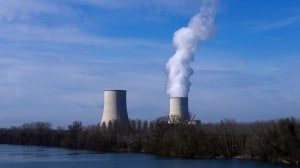Oui Non, sighs Europe
The French presidential elections this year are fated to be world-famous for the one who didn’t win. Though everybody rules out the pos...

The French presidential elections this year are fated to be world-famous for the one who didn’t win. Though everybody rules out the possibility of his making it through the final round, Jean-Marie Le Pen’s polling of 17.5 per cent of the popular vote in the first round has sent the European media into a twist.
In his long and unlovely career, 73 year-old Le Pen has earned himself the reputation of a bigoted buffoon and an openly racist demagogue who believes Nazi treatment of Jews was no more than a ‘detail’ of history.
Le Pen’s success was feverishly, widely, denounced. The only two who seem pleased, wrote Boris Johnson in Britain’s THE DAILY TELEGRAPH, are Vladimir Zhirinovsky, ‘‘who believes Russia should hurry up and bomb America’’ and Filip de Winter of the Flemish Vlaams Blok, ‘‘whose campaign symbol is a pair of pendulous boxing gloves’’.
But how could such a man completely knock out the Left from the ballot paper in France? Is it due to the splitting of the Left vote? Or because it drifted far too much to the Centre? Owning the Centre, argued Jonathan Freedland in THE GUARDIAN, is always a smart thing to do in politics, but not when the primary task is to energise your own side.
Does the extreme right’s strong showing confirm anti-immigrant anxieties in the country? Many pointed out that voters are angry at mainstream parties ignoring the perceived link between rising crime and ‘uncontrolled’ immigration. Others insisted it bared a larger disenchantment — with France’s political elite and their ‘politics as usual’, with the European Union, even globalisation. But nobody was entirely certain — was it antipathy or apathy that propelled Le Pen to second place this election?
It may be the ‘domino effect’, offered a columnist in THE NEW YORK TIMES, part of a process of new gain for the far right in Europe. Recent elections in Western Europe have signaled a general turn to the right. Centre-left governments and coalitions lost office in Italy, Norway, Denmark and Portugal and strong challenges are being mounted by conservative candidates in the campaigns in Germany and the Netherlands.
No racism please…
Is the Le Pen phenomenon infectious, can it happen here, they worried in Britain this week as political rhetoric on asylum and immigration in the country rose a level higher. With local elections just a week away, Home Secretary David Blunkett spoke of asylum seekers ‘swamping’ certain schools.
THE DAILY TELEGRAPH commended Blunkett for not being cowed by the ‘race relations industry’ which would rather he avoided talking about immigration altogether. But from across the ideological line, THE GUARDIAN hastened to reassure Britons there could be no British Le Pen. Not because the British are a better people, but ‘‘because, for nearly 40 years, we have had political institutions such as the Commission for Racial Equality, a legal framework embodying successive race relations acts, and an increasingly open culture…’’. The agonising continues.
Is the ascendancy of the far right in Europe a post-September 11 contagion? Is it confined to Europe? As we in India grapple with religious fundamentalism in Gujarat and elsewhere, some of those anxieties in Europe touch off familiar echoes.
White House haze
In America, Zacarias Moussaoui’s trial coincided with stock-taking of the ‘war on terror’. Moussaoui is alleged co-conspirator of the September 11 hijackers. His goal, he told the federal court in Alexandria, was ‘‘the destruction of the United States’’.
THE WASHINGTON POST immediately seized upon ‘Mr Moussaoui’s Message’ to remind Americans of the war yet not won. Osama bin Laden, it pointed out, is out there. It shared its fears about ‘‘the temptation to change subjects, to lose focus and so also lose momentum in the war…’’ It was censorious about Democrats ‘‘who want to talk about domestic issues in this election year…’’ In THE NEW YORK TIMES, George Packer begged to differ.
Packer hailed the sound of Democrats taking positions on national issues, ‘their voices scratchy from long disuse’, as the ‘rebirth of debate’. After September 11, patriotic fervour and wartime self-censorship, he said, had silenced the opposition for far too long.
Most commentators agreed on one thing though: Washington is no longer as clear-sighted as it was.
It is mired in the complexities of the Middle East, where the Bush administration is deeply divided on strategy. Always quick to pounce upon any discomfiture in the White House, NYT columnist Maureen Dowd put words in Bush’s mouth: ‘‘Where has my moral clarity gone? Poppy says moral clarity always gets lost in the Middle East casbah of smoke and mirrors. That region is all nuance. I don’t do the nuance thing… Whew… I’m gonna go for a run and come up with the marshals’ plan for Afghanistan.’’
Golf by the West Bank
Also in the NYT, Middle East expert Thomas Friedman had a suggestion: Let’s all reach out for the remote and switch to the Golf Channel.
Where there is only golf. No ‘terrorism experts’, no history and no arguments about history. No one blames America for everything bad that happens to them. Where you can see a game that respects rules and clearly defines what is inbounds and what is out of bounds…
TIME magazine took Friedman’s point. It changed the subject. Instead of merely covering the world, this week its correspondents took the high road, collecting ‘Asian heroes’. In the 42-page special package, there’s Sachin Tendulkar and Shabana Azmi from India. And Umer Farooq from Kashmir (not India).
Photos


- 01
- 02
- 03
- 04
- 05





























